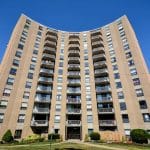A Phil Hall Op-Ed: Earlier this month, Bank of England Chief Economist Huw Pill stated the reason that rents were so high in his country was not because of elevated interest rates, but because of “quite large increases in immigration” – net migration broke a record in 2022 with 745,000 people moving into the U.K.
“The population is growing. To some extent, the rents are really a reflection of supply and demand factors and reflect things that aren’t to do with monetary policy,” he said.
Over in Canada, the government acknowledged the massive influx of immigrants in recent years exacerbated that nation’s housing shortage – that country saw its population grow by over 430,000 in the third quarter of 2023, the greatest quarterly increase recorded since 1957. An internal Canadian government document that was made public earlier this year warned that immigration officials “must understand the misalignment between population growth and housing supply, and how permanent and temporary immigration shapes population growth.”
Not unlike the U.K. and Canada, the U.S. has experienced a massive influx of people moving in – although the American version is skewered heavily to illegal immigrants. Just how many illegal immigrants are here in is anyone’s guess. In 2021, the first year of the Biden administration (when the situation went from bad to worse), there were an estimated 10.5 million illegal immigrants on American soil, or roughly 3% of the total population. That number obviously hemorrhaged since then. Last December, U.S. Border Patrol had nearly 250,000 encounters with illegals crossing from Mexico, a new record high.
But unlike our British and Canadian friends, the American government isn’t talking about how a surplus of new arrivals impacts the supply-and-demand imbalance in housing. Indeed, trying to speak frankly and honestly about the legal status regarding those sneaking over border has become nearly impossible – remember how President Biden was arm-twisted into apologizing for referring to the alleged killer of college student Laken Riley as an “illegal immigrant”?
At the moment, many of the new illegal immigrants are being housed by government agencies in leased hotels or homeless shelters, while others are packed into crowded housing situations courtesy of their friends and families, nonprofits and (yes) criminal enterprises. But those situations are not sustainable. If these illegal immigrants manage to evade deportation and stay for the long-haul, where are they going to live?
Currently, housing availability is a challenge in most markets and the costs of both buying and renting are precarious for too many American citizens. The situation is even worse for those who evaded the law to live here. Illegal immigrants are ineligible for most federal rental assistance programs, so public housing is off limits for them. And even if they wanted to work hard to afford a place to live, illegal immigrants have trouble securing and saving a cash flow because they are mostly trapped in low wage and inconsistent jobs.
There are a few attempts to address this matter a state and local level. Last January, a bill was introduced in the California legislature to widen the state loan program’s eligibility requirements to allow illegal immigrants to receive down payment loans designed for first-time home buyers. While the intentions behind this bill might be noble, it nonetheless comes at a time when California’s median home prices sailed above the $900,000 level for the first time – even if the illegal immigrants could access loans, could they afford to buy and maintain a home in the state?
In fairness, the U.K. and Canadian governments have not come up with any serious solutions for their respective problems regarding the impact of too-high immigration rates on housing. But at least they are acknowledging something is wrong. After all, the first step to solving a problem is admitting that it exists. Sadly, the U.S. government hasn’t even reached that first step – and it currently shows no signs of moving in that much-needed direction.
Phil Hall is editor of Weekly Real Estate News. He can be reached at [email protected].
Photo: vichinterlang / iStock
















It is my opinion that illegal immigrants (aka “illegal aliens” per the law) should not be eligible for any public assistance from taxpayers directly or indirectly and should not be eligible for mortgage loans. Those should be only for U.S. citizens. We have enough challenge to care for citizens in need.